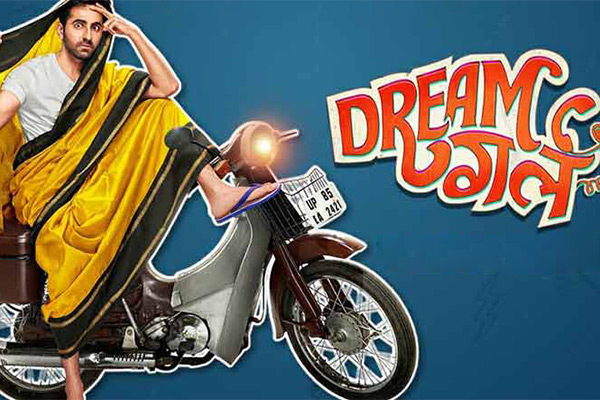Set in a small town of Mathura, Dream Girl begins with the story of a little boy who is forced to act as Sita in the local Ramleela that happen in the town every year. Eventually, he grows up to be a man and still plays the role of Sita for the play. He is much appreciated because he can modulate his voice for the role. The plot is predictable with every twist and turn of the story but the one-liner comedy is what’s purely entertaining.
While the movie feels like a sitcom with puns and comical pauses injected in almost every dialogue. What is worth observing is the how people around him react to him being a goddess. Karamveer Singh (Ayushmann Khurrana), who plays the role of Sita is revered in the town, kids seek his blessings before they begin something new. The town respects his family and him.
Although the movie challenges masculinity, ironically it does not give much importance to the female characters in the movie.
Karamveer is a young unemployed man, who desperately searches for a good job to help his widowed father in paying off the loan. Finally, Karamveer finds a job, a very unusual one but a predictable one. The job is at the call center, where women engage in flirtatious banter with lonely callers at night and Karamveer is too good at what he does: faking his voice. The call center is stereotyped with typical pink colored walls and photos of half-naked female models pinned onto the walls. The women working at the call center are not as valued as Karamveer, they are not given much screen time. The call manager of the center is showcased as an obese sari-clad lady who is tries to flirt with Karamveer.
Also read: Kabir Singh: The Poster Boy For Toxic Masculinity
What is surprising is that Karamveer is respected when he’s playing the role of Sita in the play yet he has to conceal the truth about his job being a female voice artist. Modulating his male voice to female is something which is frowned upon in the society. Forget about being genderfluid/genderqueer or transgender, modulating your voice into culturally female voice is not accepted in the society.
The movie has been tailored into a family entertainer by cutting away any sort of humour or sex or phone sex conversations. Directed and written by Raaj Shaandilyaa, the movie seems to highlight the troubles of people who are lonely in their lives but doesn’t give the solution to it. Although the movie challenges masculinity, ironically it does not give much importance to the female characters in the movie. They are limited to the role of being the love interest (Nushrat Barucha) of the hero or as a woman who hates the opposite gender because of her bad experiences (Nidhi Bisht) or as the old grandma who loves her booze and food.
Modulating his male voice to female is something which is frowned upon in the society. Forget about being genderfluid/genderqueer or transgender, modulating your voice into culturally female voice is not accepted in the society.
The freedom for anyone to choose his/her profession or even gender orientation is something that needs the progression of minds. Dream Girl shows how a Karamveer a.k.a Pooja is struggling to manage his life, yet wouldn’t reveal his profession until the last minute when he has no option left. He has the fear of being judged and criticized by his own family and lover. Men showing their feminine sides of them is something that has to be more accepted in the society and the movie does that up to some extent. It could have portrayed a much more boarder perspective of how Pooja feels emotionally and physically. It’s not always a comic-filled life when you live multiple genders within you.
There is hilarious cultural comedy by Karamveer’s father when he suddenly becomes fluent in Urdu and turns Muslim for his lover. The father, the shayar cop who mispronounces almost every Urdu word, the Haryanvi young boy, the lesbian man-hating editor, all play a brilliant role of being Pooja’s lover. They add a layer of fun to the situation of our Dream Girl Pooja.
Also read: Mard Ko Dard Kyon Nahin Hota?— On Hegemonic Masculinity
The film ends with comedy of errors and seems a tad hurried. In the genre of comedy, this film is impressive as it brings comedy for the light-hearted but at the same time it fails to touch the subject of how men could be feminine, men could be Dream Girls too.
Leo Oommen is a copywriter and a learning feminist. She has completed her bachelor’s degree in journalism. She is an epeolatrist and a bibliophile, who loves to critique the latest advertisements, sitcoms, and films. You can find her on Twitter and Instagram.
Featured Image Source: Sify




